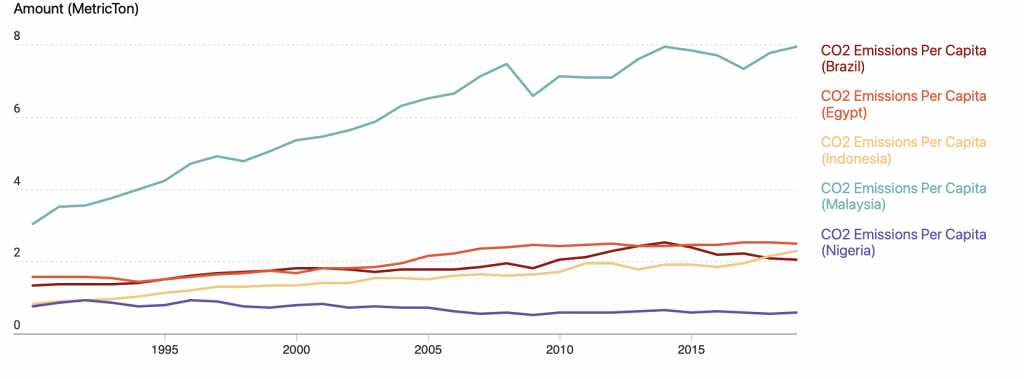Global climate change conversations often centre around energy consumption, particularly industrial activities measured by net emissions. A close look at the framing of the conversation creates the problematic outlook that portrays climate change as a first-world problem. It is not. However, by this measure, Sub-Saharan Africa’s contribution to climate change is only a fraction of global actions that endanger the environment.
It is not uncommon to see African leaders call for a pragmatic approach to climate change conversations and rhetorically associate some degree of emissions with industrialization, a path many African nations say the global north denies them in their green push.
According to a World Bank report, more than 30 million people worldwide, particularly in African countries like Nigeria, the Democratic Republic of the Congo, and Ethiopia, cannot afford basic electricity services due to the COVID-19 pandemic. Around the world, there is an increase in universal access to electricity. However, the share of African households (57 per cent of the population) without electricity continues to increase while it declines elsewhere.
The framing of the climate change narrative continues to leave Africa behind. So how do we convince policymakers or win the hearts of their constituents, who live without access to electricity or even clean cooking gas, to embrace alternative energy?
Framing the problem
Although Nigeria’s GHG emission rate is considerably lower than countries with similar populations like Brazil, Indonesia, and Malaysia, the impact of climate change is perhaps more pronounced than anywhere else in the world. For example, in Nigeria, 25 per cent of cardiovascular disease-related deaths are caused by air pollution. Similarly, the climate crisis has also been linked with increased cholera and meningitis outbreaks. The latest floods in Nigeria have caused the displacement of more than 1.3 million people, a number that is equivalent to the total population of Estonia. This is what a climate crisis looks like.

However, many African countries and their citizens fail to appreciate the urgency of the issue because of poor framing of the message from the thought leaders in the global north. These messages often sound lofty but lack grounding in reality.
Climate communications expert, Susan Joy Hassol, contests the language “climate change” and “global warming”, pointing out their problematic identity. We agree. She highlights the technical issue and how it has led to public confusion. Even technocrats are confused about climate change, underscoring the critical communications problem at the root of the crisis. The biggest communication failure is that an issue like climate change, which has the most impact on everyday people, has yet to reach its critical audience. It remains a conversation prevalent among policymakers, scientists, activists and the broader elite, where understanding is almost at an esoteric level.
For a displaced Nigerian, understanding the climate crisis from the point of view of their peculiar circumstances, their activities and immediate impact has the potential to lead to tangible behavioural change and policy change due to the demand for practical answers from their public officials. However, while a few progressive politicians are creating climate-friendly policies, it is often met with pushback from their constituents, who see them as a burden rather than a solution.
Communicating Climate Change Right
To move the conversation about climate change beyond its current level, we will need to make deliberate efforts in how we frame the language, present information, and engage with the public on the issue.
Here are three ways to do this:
Demand for climate policies should come from the people
The public understands it can demand basic human needs such as food, water, shelter, security, health, and jobs. Similarly, the public has to require that climate policies be created, ratified, and implemented. For example, public demands for interventions such as clean cooking stoves, tree planting, and water supply management can ensure that they are political priorities and accelerate progress.
Telling local stories for impacted people
Tragic situations like the flooding and displacement of farmers provide an opportunity for culturally relevant storytelling, which can showcase the impact of adverse weather conditions caused by climate change and help increase understanding of the issues. Flooding often has spillover effects on the nation’s agriculture, health, infrastructure, and overall economic well-being. It is imperative then to communicate that not only are the floods triggered by the climate crisis, but Nigeria can also ensure that lives and property are protected by adopting mitigation measures now, which will eventually pay off in the long term. This helps to recruit more advocates.
Climate change is a healthcare issue
In public health communication, the context of diseases is brought closer to the people. They live with it, feel it, and experience it, and as a result, it is easier to empathize with health issues aggravated by climate change. Therefore, it is important to leverage health communicators trusted by the public to help explain the links between climate change and life-altering diseases. This would help clarify the issues rather than leave them in the realm of political and energy security conversations. Health communicators can effectively change behaviors by bringing people to embrace climate-health-friendly habits and improving public support for mitigation efforts.
Final thoughts
Communicating climate change can be fraught with challenges. A general guideline that can ensure an effective communication process includes identifying and understanding the audience, framing messages that target their values and concerns, and highlighting solutions. It is important to highlight the benefits of acting now rather than later. While focusing on the negative impacts of climate change might be tempting, it would more likely result in pushback.



